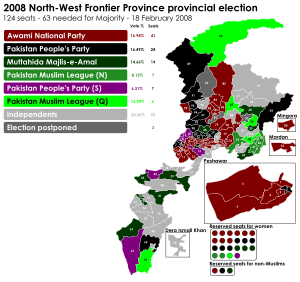| |||||||||||||||||||||||||||||||||||||||||||||
All 124 seats in the Provincial Assembly 63 seats needed for a majority | |||||||||||||||||||||||||||||||||||||||||||||
|---|---|---|---|---|---|---|---|---|---|---|---|---|---|---|---|---|---|---|---|---|---|---|---|---|---|---|---|---|---|---|---|---|---|---|---|---|---|---|---|---|---|---|---|---|---|
| |||||||||||||||||||||||||||||||||||||||||||||
 Results of the Election by constituency | |||||||||||||||||||||||||||||||||||||||||||||
| |||||||||||||||||||||||||||||||||||||||||||||
Provincial elections were held in the North-West Frontier Province to elect the members of the 9th Provincial Assembly of North-West Frontier Province on 18 February 2008, alongside nationwide general elections and three other provincial elections in Sindh, Balochistan, and Punjab. The remaining two territories of Pakistan, AJK and Gilgit-Baltistan, were ineligible to vote due to their disputed status. These were the last elections held under the provincial name "North-West Frontier Province", later changed to Khyber Pakhtunkhwa following the Eighteenth Amendment to the Constitution of Pakistan. [1]
The elections resulted in a hung parliament with the Awami National Party (ANP) being the largest party. The ANP was able to form a coalition government with the Pakistan People's Party (PPP) after winning reserved seats for women and non-Muslims, and their candidate for the Chief Minister position, Haider Khan Hoti, was elected unopposed.[2][3]
- ^ "An Overview, KP Assembly". www.pakp.gov.pk. Retrieved 5 August 2021.
- ^ Yusufzai, Ashfaq (1 March 2008). "ANP names Amir Hoti for Frontier CM post". DAWN.COM. Retrieved 13 September 2023.
- ^ "Hoti elected unopposed leader of house in NWFP". Brecorder. 2 April 2008. Retrieved 13 September 2023.



